The Role of TPN in Preconception Nutrition Optimization
Understanding the Critical Role of TPN in Preconception Nutrition
Total Parenteral Nutrition (TPN) is an essential intervention for women with complex gastrointestinal conditions or severe malnutrition, ensuring adequate nutrient delivery when enteral feeding isn’t feasible. Its application extends beyond acute management, playing a pivotal role in preconception planning and optimizing maternal nutrition, which has lasting impacts on pregnancy outcomes. This article explores how TPN supports women before conception, its implications during pregnancy, and the multidisciplinary approaches necessary to maximize benefits while minimizing risks.
Fundamentals of TPN and Its Components
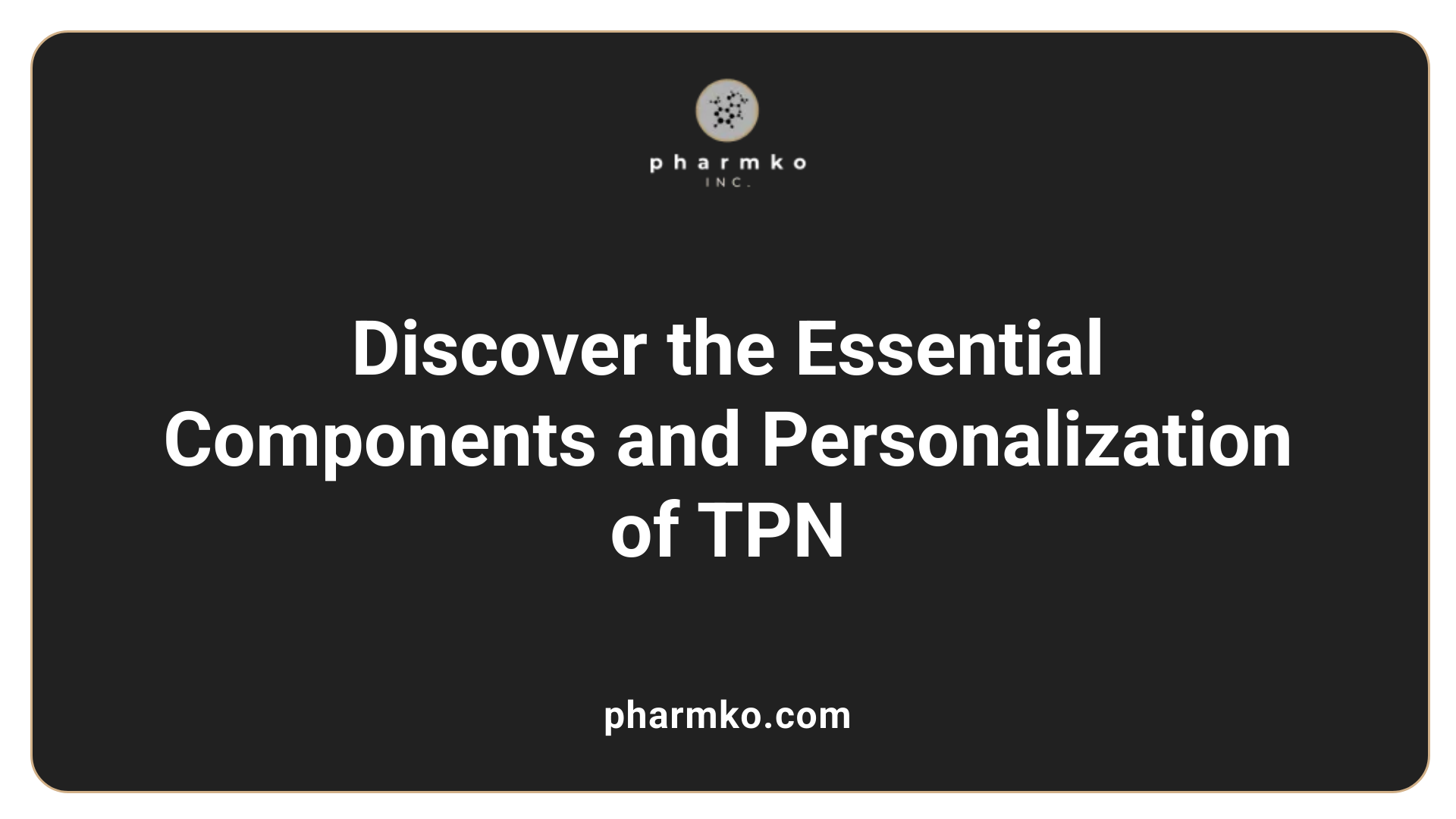
What is TPN?
Total Parenteral Nutrition (TPN) is a specialized method of providing complete nutrition directly into the bloodstream through an intravenous line. This technique is essential for patients who are unable to meet their nutritional demands via oral or enteral routes due to various medical conditions, such as gastrointestinal dysfunction, short bowel syndrome, or postoperative situations.
By bypassing the digestive system, TPN ensures that vital nutrients are delivered efficiently, supporting metabolic functions, growth, and overall health. It is frequently used during pregnancy when oral intake is insufficient, such as in cases of hyperemesis gravidarum or pre-existing malnutrition, to promote fetal development.
Components of TPN
The formulation of TPN includes several critical nutrients, which can be tailored according to individual needs. These are mainly divided into macronutrients and micronutrients:
- Lipids: Provide essential fatty acids and a dense source of calories.
- Dextrose: Supplies carbohydrates necessary for energy.
- Amino acids: The building blocks for protein synthesis, crucial for tissue repair and growth.
- Vitamins and trace elements: Support various metabolic pathways and bolster immune function.
- Electrolytes and minerals: Maintain fluid balance, nerve function, and muscle contractions.
These components are mixed under strict sterile conditions to form a customized solution that meets each patient’s specific nutritional requirements.
Tailoring TPN to individual needs
Formulations are adjusted based on factors such as age, weight, metabolic requirements, disease state, and pregnancy status. During pregnancy, for example, energy and nutrient requirements are carefully estimated and monitored using indirect calorimetry and considering maternal weight gain guidelines.
This personalized approach helps prevent metabolic imbalances, deficiencies, and growth issues, especially in vulnerable populations like preterm infants or women with complex medical histories. Ongoing monitoring of serum electrolytes, liver and renal functions, and nutritional markers ensures optimal support and minimizes risks.
| Nutrient Type | Role | Special Considerations |
|---|---|---|
| Lipids | Energy source, essential fatty acids | Adjusted to prevent hyperlipidemia |
| Dextrose | Main carbohydrate | Monitored to avoid hyperglycemia |
| Amino acids | Support protein synthesis | Starter preparations boost nitrogen balance |
| Vitamins & trace elements | Metabolic cofactors and immune support | Dosed according to needs and deficiencies |
| Electrolytes & minerals | Maintain fluid and nerve/muscle functions | Regular assessments are essential |
Careful customization and vigilant monitoring of TPN ensure it effectively meets the nutritional needs of patients, including pregnant women and preterm infants, supporting growth, recovery, and healthy pregnancy outcomes.
Indications for TPN in Preconception and Pregnancy
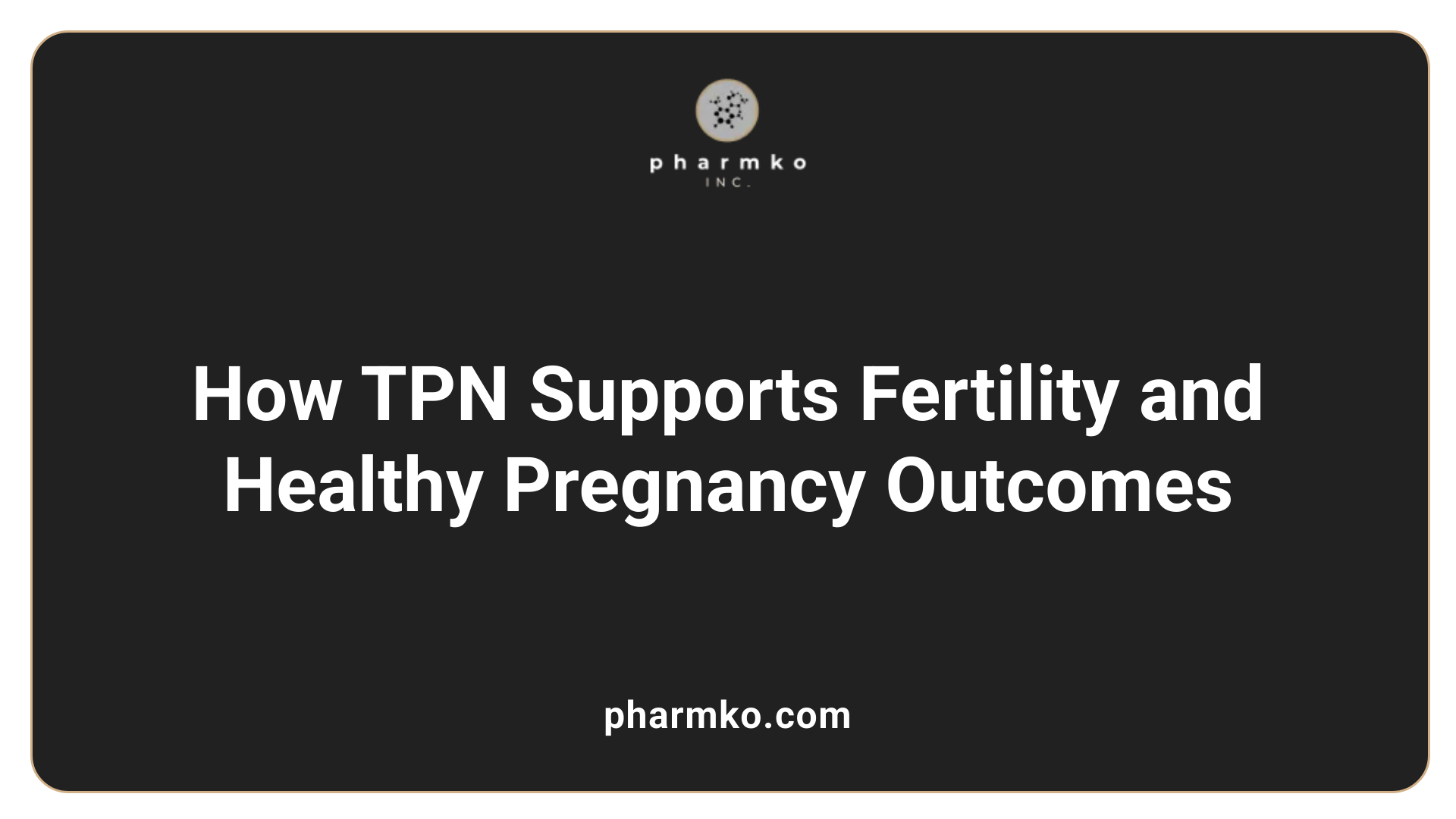 Total parenteral nutrition (TPN) plays a significant role in optimizing maternal health before conception and during pregnancy, especially in women with complex nutritional issues. When is TPN indicated for women planning pregnancy? TPN is primarily used in women who experience severe malnutrition or have gastrointestinal failure, including conditions like short bowel syndrome or severe inflammatory bowel disease. In these cases, oral or enteral feeding is insufficient or impossible, and TPN provides essential nutrients to restore nutritional adequacy prior to conception.
Total parenteral nutrition (TPN) plays a significant role in optimizing maternal health before conception and during pregnancy, especially in women with complex nutritional issues. When is TPN indicated for women planning pregnancy? TPN is primarily used in women who experience severe malnutrition or have gastrointestinal failure, including conditions like short bowel syndrome or severe inflammatory bowel disease. In these cases, oral or enteral feeding is insufficient or impossible, and TPN provides essential nutrients to restore nutritional adequacy prior to conception.
Proper nutritional status established through TPN can improve fertility and support conception. It also helps minimize risks associated with poor maternal nutrition, such as fetal growth retardation, preterm labor, and increased perinatal morbidity. By ensuring that women enter pregnancy in optimal nutritional condition, TPN can directly contribute to healthier pregnancy outcomes and reduce complications.
Use of TPN to prevent intrauterine growth retardation and premature labor has been documented. Adequate maternal nutrition ensures proper fetal development and can decrease the incidence of intrauterine growth restriction (IUGR), which is linked to adverse neonatal outcomes.
The role of TPN extends beyond preconception care. During pregnancy, TPN can continue to support women with ongoing gastrointestinal conditions or nutritional deficiencies. For example, women with short bowel syndrome or severe malabsorption may rely on long-term TPN support during pregnancy to meet the increasing nutritional demands of the fetus.
In summary, TPN is crucial for women with significant nutritional deficiencies or intestinal failure, helping them attain a healthier pregnancy baseline. When effectively managed, it can support fetal growth and reduce the risks of adverse outcomes such as IUGR and preterm birth.
How does TPN prevent adverse pregnancy outcomes?
TPN contributes to fetal health by delivering vital nutrients directly into the bloodstream, bypassing compromised gastrointestinal systems. This targeted nutrition supports intrauterine growth and development, which are essential for a healthy pregnancy.
Evidence from case reports shows that women on long-term TPN can conceive and carry pregnancies to term without significant complications. Proper management of caloric and micronutrient intake—monitored and adjusted using techniques like indirect calorimetry—ensures that both maternal and fetal needs are met.
Reduced risks of prematurity and low birth weight are associated with sufficient maternal nutrition supplied through TPN. Specifically, maintaining appropriate energy levels and nutrient balance via TPN supports ongoing fetal growth and development, thereby preventing intrauterine growth retardation.
In conclusion, TPN's ability to provide essential nutrients directly into the bloodstream helps support healthy pregnancies in women with complex health conditions. Its use, combined with careful monitoring and multidisciplinary care, enhances pregnancy outcomes and minimizes risks for mothers and infants alike.
TPN in Women with Gastrointestinal Failures and Complex Conditions
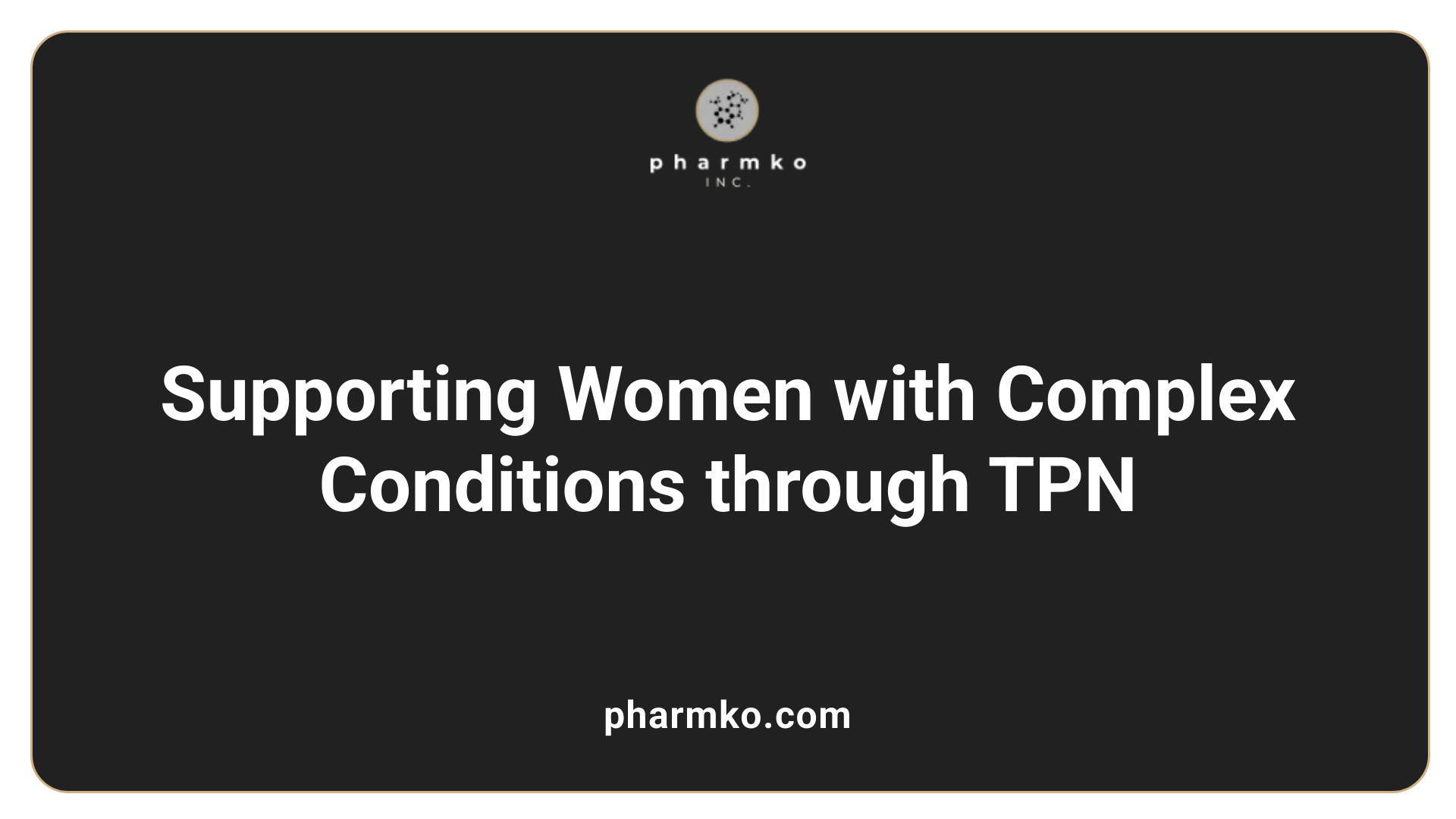
What is the significance of TPN in supporting women with gastrointestinal failure or during pregnancy complications?
Total parenteral nutrition (TPN) is vital for women suffering from severe gastrointestinal conditions that impair nutrient absorption or intake. In cases such as short bowel syndrome (SBS) or other forms of intestinal failure, TPN provides all necessary nutrients intravenously, bypassing dysfunctional segments of the gastrointestinal tract.
This nutritional support is especially crucial during pregnancy, where adequate nutrient delivery is essential for fetal growth and maternal health. Several documented cases highlight women who rely on long-term TPN since childhood due to conditions like SBS or chronic pancreatitis. Surprisingly, these women can conceive and carry pregnancies to full term successfully.
Understanding TPN's role emphasizes its importance as a life-sustaining therapy. It not only maintains nutritional status but also enables women with complex conditions to achieve pregnancies that might otherwise be impossible due to malnutrition or medical instability.
What are the challenges and management strategies for such cases?
Managing pregnancies in women dependent on long-term TPN presents unique challenges. Risks include infections related to central venous access, metabolic imbalances, liver dysfunction, and the potential for micronutrient deficiencies.
To address these issues, a multidisciplinary team approach is essential. Obstetricians, gastroenterologists, nutritionists, pharmacists, and neonatologists work together to maintain optimal care.
Strategies include:
- Careful monitoring of serum electrolytes, liver function, and nutritional markers.
- Tailoring TPN formulations to meet the evolving needs of pregnancy, including appropriate caloric and micronutrient adjustments.
- Minimizing infection risks through strict aseptic protocols for venous access.
- Supporting maternal weight gain to ensure fetal development.
- Planning for delivery and postpartum nutritional needs.
Through vigilant management and technological advancements, women on long-term TPN can experience successful pregnancies with healthy outcomes for both mother and child.
Clinical Guidelines and Best Practices in TPN Use
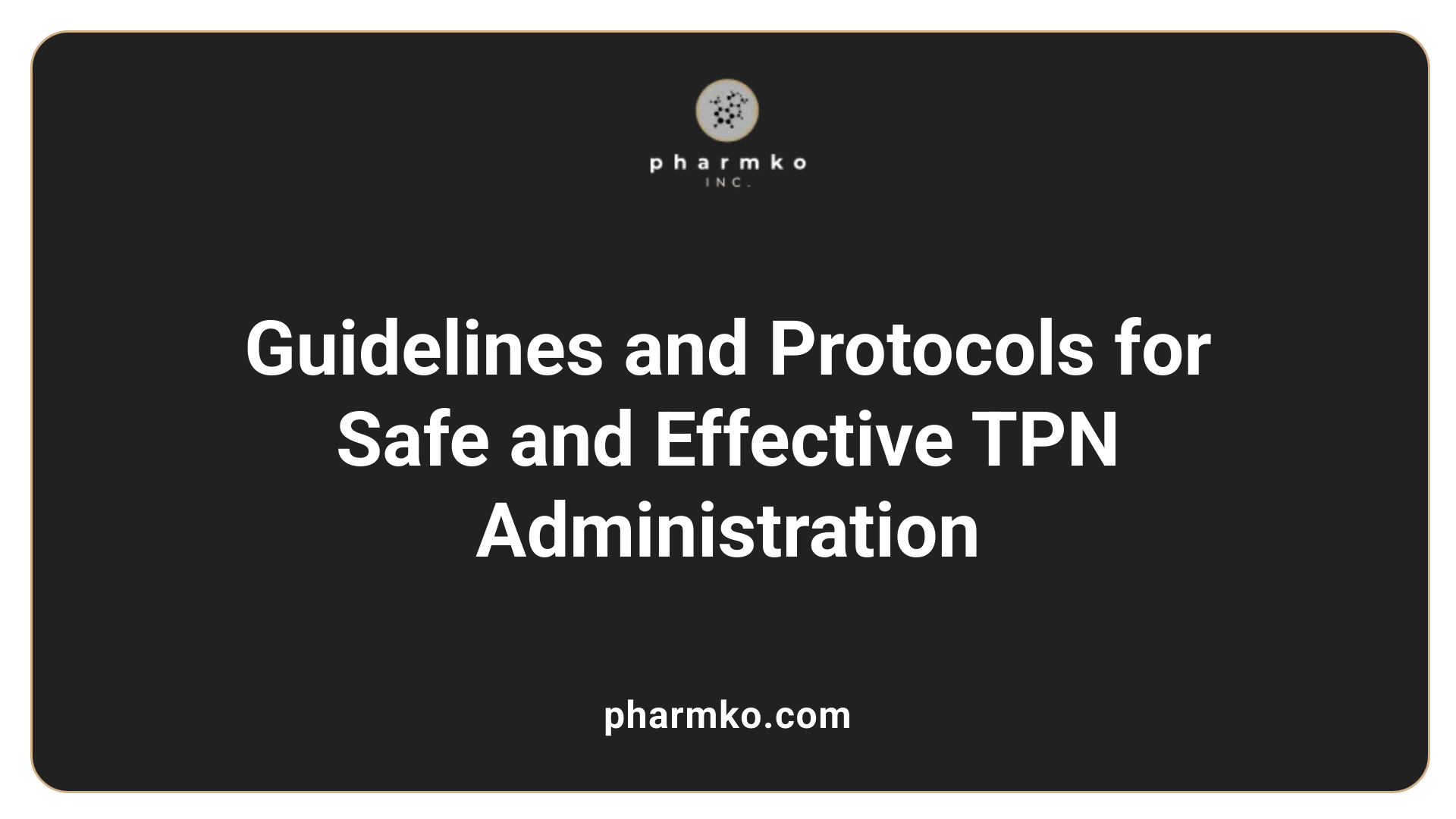
What are the clinical guidelines for using TPN during preconception and pregnancy?
When administering Total Parenteral Nutrition (TPN) during preconception or pregnancy, healthcare providers follow detailed, individualized plans to optimize maternal and fetal health. These guidelines recommend adjusting the nutrient composition based on the stage of pregnancy, weight, and specific nutritional needs. Regular monitoring of the mother’s serum electrolytes, liver and kidney functions, and nutritional markers is vital to prevent complications.
A multidisciplinary team—comprising obstetricians, nutritionists, gastroenterologists, and pharmacists—closely manages TPN therapy. This team continuously evaluates both maternal and fetal well-being, ensuring the therapy supports healthy growth and development. Preventative measures, including strict aseptic technique during infusion and vigilant infection control, are critical. The goal is to provide necessary nutrients efficiently while minimizing risks such as metabolic disturbances or line infections.
Overall, current guidelines emphasize the importance of personalized care, frequent assessments, and coordinated efforts to ensure safe TPN use in pregnant women requiring long-term nutritional support.
Are there specific dosing and administration protocols?
Yes, detailed protocols govern the dosing and administration of TPN to ensure safety and effectiveness. Doses are typically determined based on clinical nutrition guidelines and tailored to the individual’s needs, often using indirect calorimetry to estimate energy expenditure. During pregnancy, caloric and nutrient requirements increase, and TPN formulations are adjusted accordingly to support maternal health and fetal development.
Administration is performed via central venous access, such as peripherally inserted central catheters (PICC lines) or implanted ports, due to the high osmolarity of TPN solutions. Infusion pumps are used to control flow rates precisely. To prevent infections, strict aseptic techniques are essential during line placement and care.
Protocols also include routine blood tests—monitoring serum electrolytes, glucose levels, liver, and renal function. Regular line inspections and adherence to infection control practices further safeguard against complications. These systematic protocols help in delivering appropriate nutrition while minimizing risks like metabolic imbalances or catheter-related infections.
| Aspect | Protocol Details | Additional Notes |
|---|---|---|
| Dosing | Guided by nutritional guidelines, adjusted via indirect calorimetry | Tailored for pregnancy needs |
| Delivery | Central venous access (PICC, ports) | Use of infusion pumps and aseptic techniques |
| Monitoring | Serum electrolytes, glucose, liver and renal function | Routine blood tests for safety |
| Line Care | Sterile handling, frequent inspections | Critical for preventing infections |
Careful adherence to these protocols ensures that TPN remains a safe, effective option for women with complex nutritional needs during pregnancy.
Risks and Complications Associated with TPN

What are the risks associated with TPN?
Total parenteral nutrition (TPN) is an essential therapy for patients with impaired gastrointestinal function. However, it carries certain risks that healthcare providers must vigilantly manage. Common complications include bloodstream infections, known as catheter-related bloodstream infections, which arise from bacterial colonization of the IV lines. Metabolic disturbances such as hyperglycemia, electrolyte imbalances—like low potassium, magnesium, or phosphate—and liver complications like cholestasis and fatty liver disease are also notable. Additionally, TPN can cause vascular issues, including thrombosis or line-related problems such as line occlusion or dislodgement.
How can complications be mitigated?
Effective management of TPN-associated risks hinges on meticulous line care, including strict aseptic techniques during catheter handling. Regular laboratory assessments help detect early metabolic disturbances or signs of liver dysfunction, enabling prompt intervention. Managing blood sugar levels, correcting electrolyte imbalances, and adjusting nutrient formulations are critical. Moreover, involving a multidisciplinary team—comprising physicians, nutritionists, pharmacists, and nurses—ensures comprehensive care.
Preventive strategies also include rigorous infection control protocols, careful monitoring for line complications, and tailored TPN formulations based on individual patient needs. Regular evaluation of nutritional parameters and early removal of central lines when no longer needed help minimize long-term risks. When these strategies are properly implemented, adverse outcomes can be significantly reduced, supporting safe and effective nutritional support.
Below is a summary table highlighting the potential risks and management strategies:
| Risk Type | Description | Prevention and Management |
|---|---|---|
| Infections | Bloodstream infections from line contamination | Strict aseptic technique, regular line care, monitoring for infection signs |
| Metabolic issues | Hyperglycemia, electrolyte imbalances, liver problems | Regular labs, insulin therapy if needed, liver function tests, nutritional adjustments |
| Vascular complications | Thrombosis, line occlusion, dislodgement | Proper line insertion and maintenance, prompt line assessment, and replacement when necessary |
Careful monitoring, proactive intervention, and a multidisciplinary approach are essential to minimize these risks, ensuring safe TPN administration and optimal patient outcomes.
Preconception Optimization and Maternal Health Outcomes
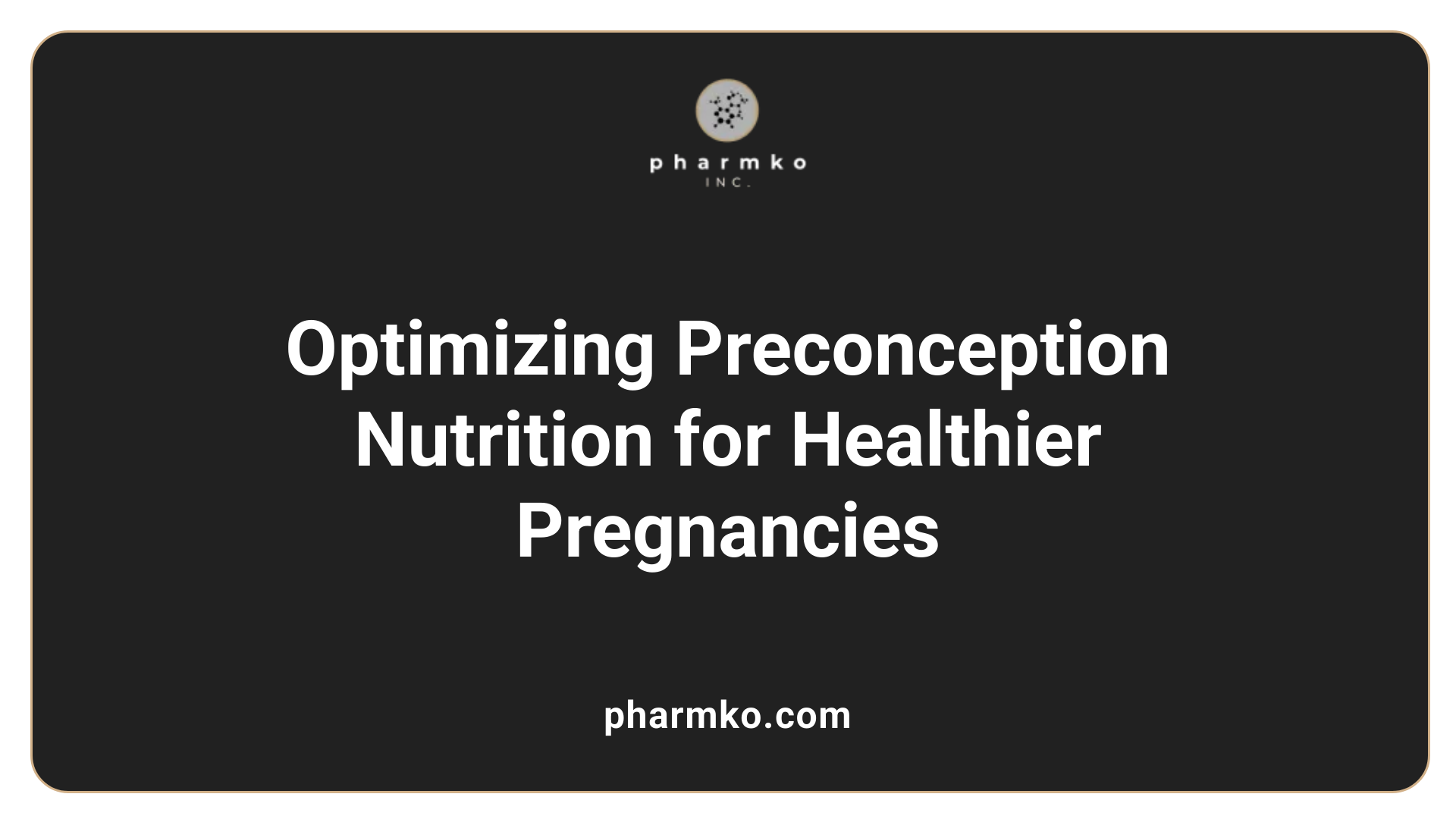
How does preconception nutrition impact pregnancy health?
Preconception nutrition plays a vital role in ensuring a healthy pregnancy and optimal fetal development. Adequate intake of essential nutrients like folic acid, iron, and calcium helps prevent congenital anomalies such as neural tube defects. Furthermore, maintaining a healthy weight before pregnancy reduces the risk of complications like gestational diabetes, preeclampsia, and premature labor. Proper nutrition supports the development of a strong foundation for both mother and baby, ultimately contributing to better pregnancy outcomes and healthier lifelong health for the child.
What is the importance of supplementation during preconception?
Supplementation during preconception is crucial, especially with folic acid, which significantly decreases the risk of neural tube defects. Since dietary intake alone may not always meet recommended levels, targeted supplements ensure essential micronutrients are available for optimal fetal growth and maternal health. Supplementation complements a balanced diet and helps prevent deficiencies that could adversely affect pregnancy outcomes. This proactive approach promotes healthier pregnancies and reduces the incidence of preventable birth defects.
How does nutrition influence fertility and weight management?
Adequate nutrition and healthy weight management are essential for fertility. Overweight or obesity can impair reproductive function and increase the risk of miscarriage, gestational diabetes, and preterm birth. Conversely, underweight women may face difficulties conceiving and higher risks of fetal growth restrictions. Achieving and maintaining a healthy weight through balanced diet and lifestyle modifications, such as regular physical activity, can enhance fertility and prepare the body for pregnancy.
Lifestyle modifications for optimal preconception health
Adopting healthy lifestyle habits is fundamental. This includes not smoking, limiting alcohol consumption, managing chronic conditions like diabetes and hypertension, and engaging in regular moderate exercise. Such modifications improve overall health, enhance fertility, and create a supportive environment for conception and pregnancy.
| Aspect | Recommendations | Additional Info |
|---|---|---|
| Nutrients | Folic acid, iron, calcium | Support fetal development |
| Weight | Achieve a BMI within normal range | Reduce pregnancy risks |
| Lifestyle | Avoid smoking, limit alcohol, stay active | Improve overall health |
| Supplementation | Folic acid 400-800 mcg daily | Prevent neural tube defects |
| Medical Checks | Preconception screening and counseling | Address health issues early |
Focusing on these factors helps women reach optimal health before pregnancy, ultimately benefiting both mother and child, and increasing the likelihood of pregnancy success. Ongoing research emphasizes the importance of evidence-based nutritional and lifestyle strategies in preconception care.
TPN and Neonatal Support
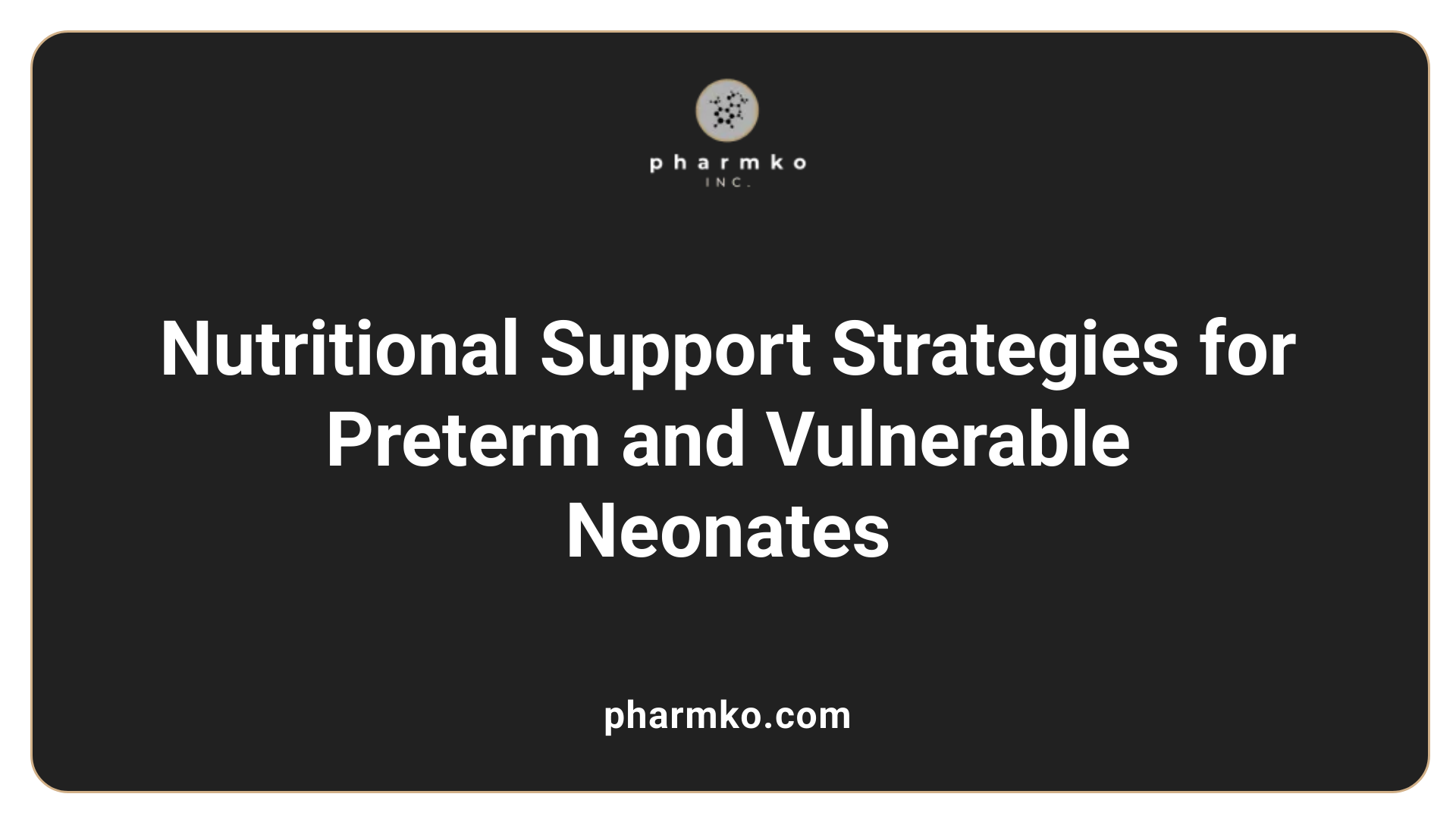
How does TPN support neonatal nutrition?
In preterm infants, particularly those born before 30 weeks of gestation or with very low birth weight, total parenteral nutrition (TPN) plays a vital role in supporting growth and development. Since their gastrointestinal systems may not be fully developed or functional, these babies cannot safely tolerate enough enteral feeds to meet their nutritional needs.
TPN provides all essential nutrients directly into the bloodstream, including dextrose, amino acids, and lipids, alongside electrolytes, vitamins, and minerals. This comprehensive nutritional support helps to prevent deficits, promote proper weight gain, and support neurodevelopment.
By addressing the specific needs of these vulnerable infants, TPN reduces the risks associated with poor nutrition, such as delayed growth, infections, and developmental delays. Proper nutritional support during this critical period ensures a healthier trajectory toward full enteral feeding and discharge.
What are best practices for neonatal TPN?
Effective use of TPN in neonates involves early initiation, usually within the first few hours after birth, especially for very preterm or compromised infants. Careful management of nutrient doses is essential, with gradual increases to avoid metabolic disturbances.
The main principles include:
- Starting with minimal doses and titrating up based on the infant’s tolerance and growth response.
- Monitoring serum electrolytes, glucose, triglycerides, and liver function regularly to identify and correct imbalances.
- Balancing macronutrients—ensuring adequate protein (amino acids) for growth while avoiding excess that could lead to metabolic issues.
- Incorporating micronutrients and trace elements at appropriate doses.
- Transitioning carefully from TPN to enteral feeds, aiming for full enteral nutrition as early as feasible.
Preventing infections related to venous access through strict aseptic techniques and secure catheter management is also crucial for maintaining safe neonate care.
Table: Neonatal TPN Management Overview
| Aspect | Recommendations | Additional Notes |
|---|---|---|
| Timing of initiation | Within the first 24 hours | Especially in preterm or critically ill neonates |
| Macronutrient management | Gradual increase, balanced nutrition | Focus on amino acids and lipids for growth |
| Monitoring | Regular labs for electrolytes, glucose, liver | Adjust TPN based on results |
| Transition to enteral feeding | Gradually reduce TPN volume | Start with minimal enteral support |
| Infection prevention | Aseptic technique, catheter care | Essential to prevent sepsis |
Why is nutrition management important during neonatal support?
Proper nutritional strategies during neonatal support are crucial for optimal growth, preventing long-term neurodevelopmental impairments, and achieving healthy weight gain. Advances in TPN protocols, guided by current research, help improve outcomes for these fragile infants.
Search query for further information: "Neonatal TPN guidelines and strategies".
The Interplay of TPN, Neonatal Nutrition, and Breastfeeding
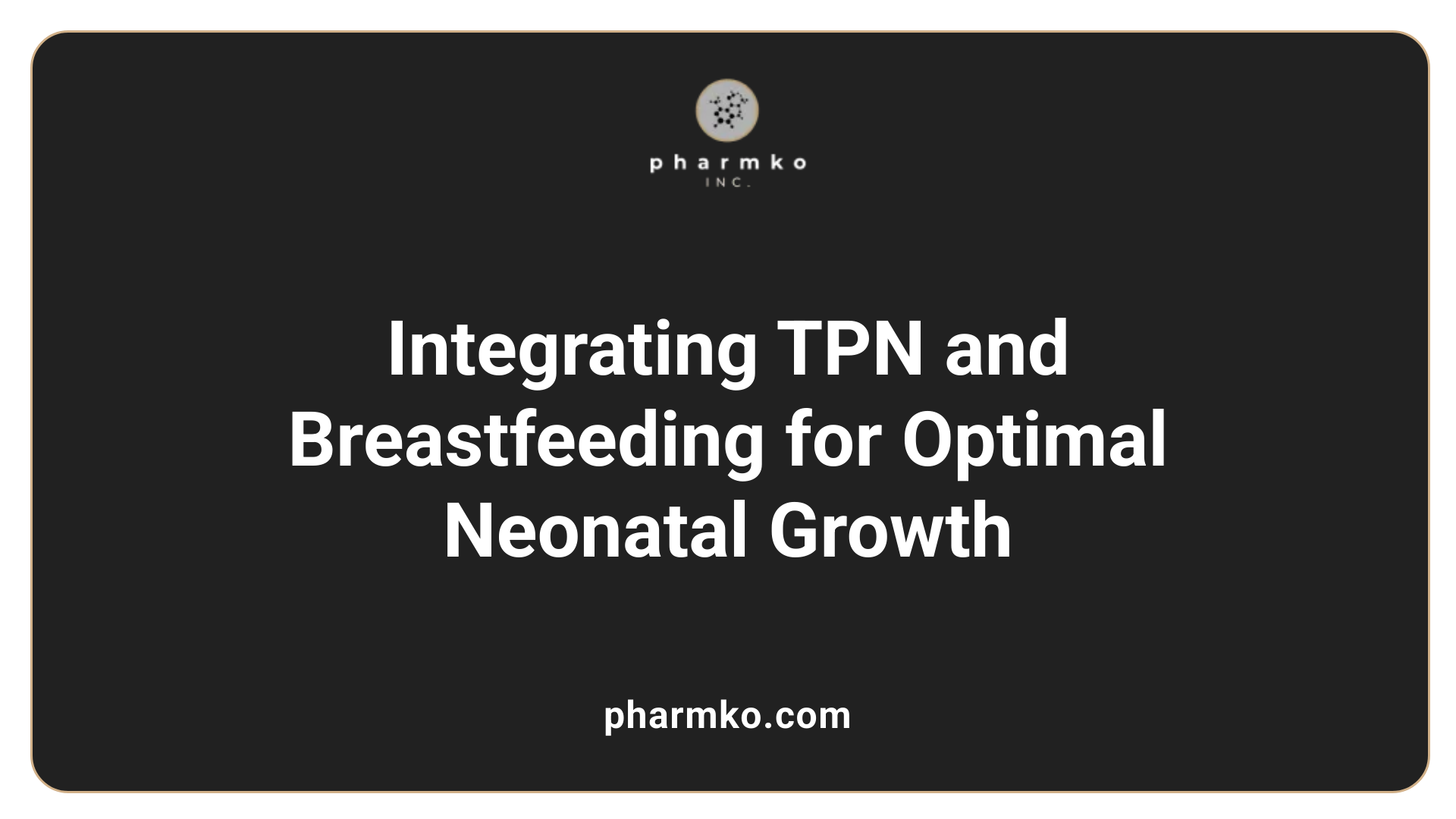
How do TPN and breastfeeding combine in neonatal care?
While Total Parenteral Nutrition (TPN) provides vital nutrients intravenously to preterm infants when enteral feeding is not yet feasible, breastfeeding offers essential immunological, developmental, and emotional benefits. TPN ensures that neonates who cannot yet feed orally or enterally receive necessary calories and nutrients for growth and recovery.
As infants stabilize, efforts are made to initiate and increase breastfeeding to promote immune protection, digestive health, and bonding. The integration of TPN with breastfeeding creates a comprehensive nutritional strategy that supports normal growth and neurodevelopment.
Medical teams typically adopt a staged approach, gradually transitioning from TPN to enteral and then to breastfeeding, minimizing nutritional deficits during this critical period. The simultaneous use of both methods optimizes growth trajectories and strengthens the infant’s immune system, establishing a foundation for long-term health.
Conclusion: The Future of TPN in Preconception and Maternal Care
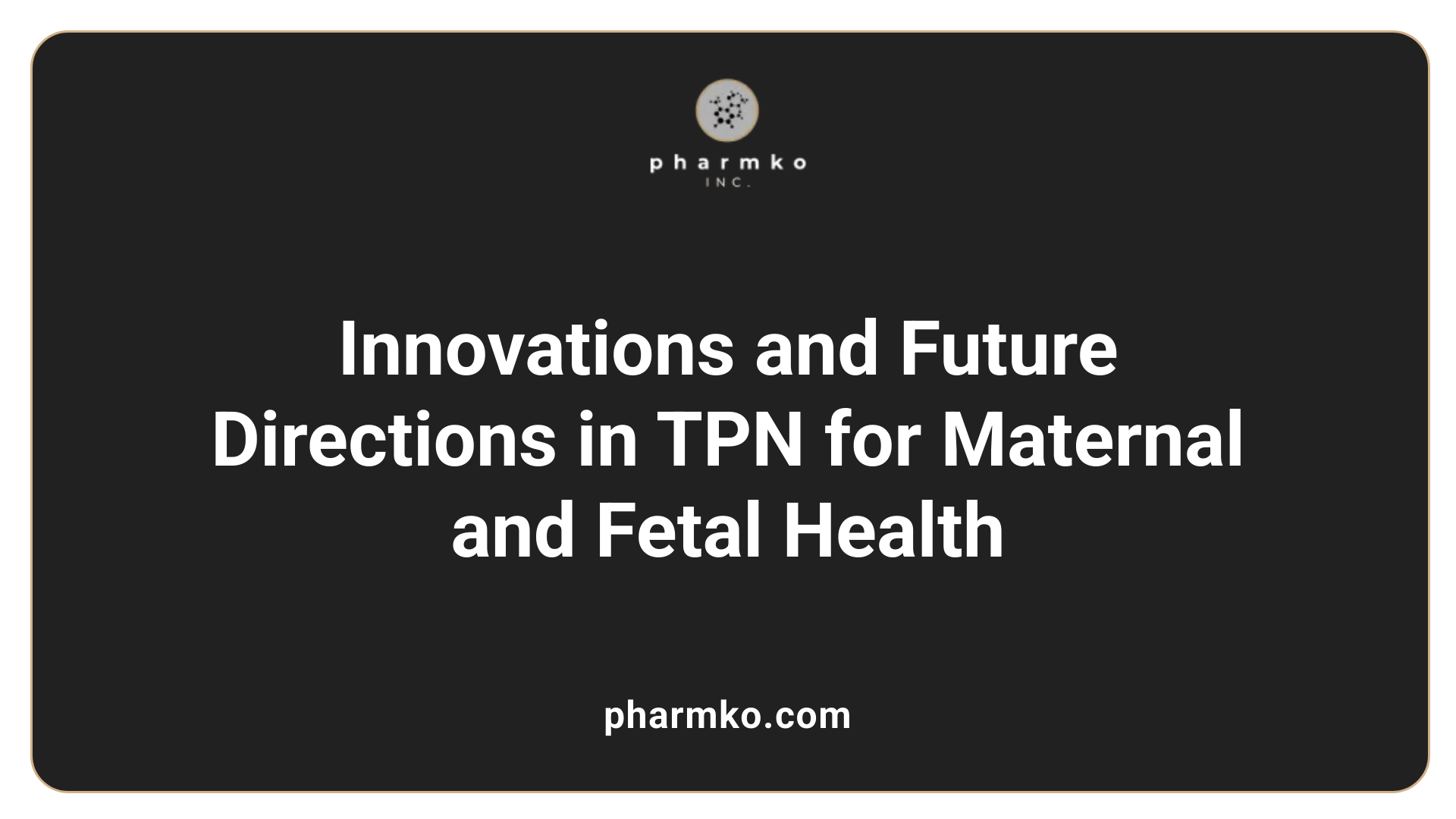 The outlook for Total Parenteral Nutrition (TPN) in preconception and pregnancy care is promising. As medical research advances, innovations in personalized nutrition, lipid management, and infection control are expected to significantly improve the safety and effectiveness of TPN. Future formulations may be more precisely tailored to individual metabolic needs, especially for women with complex conditions like short bowel syndrome (SBS) and chronic pancreatitis, enabling better maternal health and pregnancy outcomes.
The outlook for Total Parenteral Nutrition (TPN) in preconception and pregnancy care is promising. As medical research advances, innovations in personalized nutrition, lipid management, and infection control are expected to significantly improve the safety and effectiveness of TPN. Future formulations may be more precisely tailored to individual metabolic needs, especially for women with complex conditions like short bowel syndrome (SBS) and chronic pancreatitis, enabling better maternal health and pregnancy outcomes.
Research efforts are also focusing on optimizing delivery methods. Developing safer, more efficient infusion protocols and reducing risks associated with long-term venous access can decrease complications, such as infections and venous thrombosis. Additionally, ongoing studies aim to enhance the stability and compatibility of TPN components, reducing metabolic disturbances that can impact both mother and fetus.
Collaboration across disciplines will be crucial in refining TPN care. Teams comprising obstetricians, gastroenterologists, nutritionists, pharmacists, and neonatal specialists need to work synergistically. This multidisciplinary approach ensures comprehensive assessment and personalized management plans tailored to each patient’s evolving needs during pregnancy.
To improve outcomes, healthcare providers should focus on integrating innovative technologies, such as electronic monitoring systems, and following evidence-based guidelines. Regular patient education, vigilant laboratory monitoring, and individualized adjustments to TPN formulations during pregnancy are essential for success.
Overall, with ongoing research and collaborative care strategies, TPN’s role in supporting women with nutritional challenges during conception and pregnancy will continue to expand. The goal remains to ensure healthier pregnancies, better fetal growth, and improved long-term health for both mother and child.
Further Information Search Query: Future perspectives on TPN in maternal health.
Harnessing the Potential of TPN for Better Pregnancy Outcomes
In conclusion, TPN plays a vital role in preconception care, especially for women with complex nutritional needs resulting from gastrointestinal failure or malnutrition. Its capacity to improve maternal health prior to conception and support pregnancies in high-risk populations underscores the importance of personalized, multidisciplinary approaches. As research advances and clinical practices evolve, TPN will continue to be an indispensable tool for achieving optimal maternal and neonatal outcomes, emphasizing the significance of preparatory nutrition in lifelong health.
References
- Total Parenteral Nutrition - StatPearls
- Total Parenteral Nutrition During Pregnancy in a Patient ...
- Total Parenteral Nutrition During Pregnancy in a Patient ...
- TPN and Pregnancy: A Series of Successful Conceptions
- Total Parenteral Nutrition During Pregnancy in a Patient ...
- Parenteral Nutrition for the Preterm Neonate Clinical Pathway
- Breastfeeding & Total Parenteral Nutrition (TPN) in the NICU
- Preconception Health: The Role of Nutrition
- Optimizing parenteral nutrition to achieve an adequate weight ...













